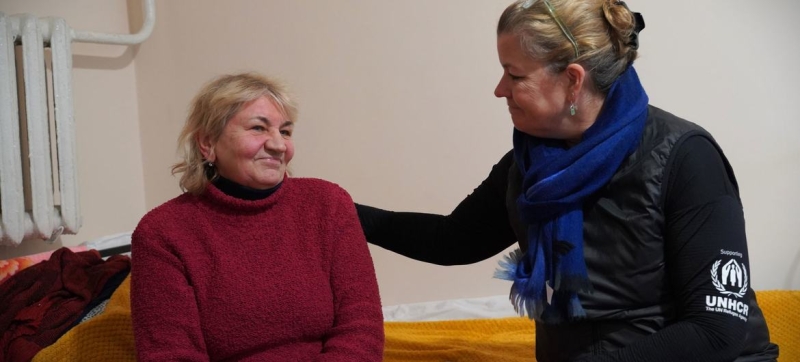
Kelly Clements and Svetlana from Kharkiv, whose apartment was destroyed by a glide bomb. Ukraine: 1,000 days after the war began, attacks continue and the number of displaced people grows Humanitarian aid
Next week marks 1,000 days since Russia’s full-scale invasion, and the needs of Ukraine’s civilian population are growing amid intense attacks and as the winter season sets in.
Russia’s destruction of the country’s energy infrastructure has resulted in the loss of 65 percent of generating capacity in recent months, and strikes that have knocked out electricity, heating, and water supplies continue.
Kelly Clements, Deputy High Commissioner for Refugees, spoke about the situation of civilians at a press briefing in Geneva today. She has just visited the country.
The number of displaced and refugees is growing
“Intensive attacks on critical infrastructure and civilian objects, as well as persistent air raids, are taking a serious toll on the physical and mental health [of the population],” Clements said.
Since August this year, some 170,000 people have been forced to flee their homes in the east of the country, many of them evacuated from areas where fighting is taking place. Another 4 million Ukrainians are internally displaced persons within Ukraine itself. 6.7 million people have found refuge outside the country. In particular, from January to August 2024, 400,000 Ukrainians crossed the border of Ukraine with European countries.
Clements said she visited a UNHCR-supported resettlement centre in Kharkiv, where she said she was surrounded by the constant sounds of explosions.
“There I met Svetlana, a 65-year-old woman whose apartment had been destroyed by a glide bomb a few weeks earlier. Her calm determination, amid the trauma of war that permeates her daily life, was a reflection of the spirit of Ukraine,” Clements said.
“Countless children continue to study online, missing out on social interactions and the classroom experience. In places like Kharkiv, children are studying in underground shelters to escape the frequent, devastating air raids. “Schools in the metro lack natural light and playgrounds,” she continued.
Clements’ visit coincided with the first snow of the season. She stressed that much remains to be done to help civilians survive the coming cold months amid widespread destruction of energy infrastructure.
The Deputy High Commissioner for Refugees also visited Uzhgorod, located near the borders with Hungary and Slovakia. The city has not been directly attacked, but the area is home to hundreds of thousands of displaced people, and capacity to accommodate them is rapidly shrinking.
UNHCR has called on donors to allocate $1 billion to help Ukrainian displaced people in 2024, but the support plan has only been funded by just over half.
How UNHCR is helping displaced people
“We are actively cooperating with the Government of Ukraine at all levels, enabling us to support the humanitarian response and recovery efforts across the country. The Government has been impressive in its leadership of the humanitarian and recovery efforts, with local teams clearing rubble quickly,” Clements said.
UNHCR is also working closely with other UN agencies and NGO partners to provide both emergency assistance and support longer-term recovery efforts. This includes providing emergency cash assistance, temporary shelter and micro-grants to help displaced people regain their independence amid the ongoing war.
“Olena, a mother from Kharkiv, opened a car wash with UNHCR support, bringing stability to her family. Inna, another displaced person, has started a sewing business in Zakarpattia, training local Roma women, building community ties and sharing her skills. Lyudmila, with the help of UNHCR, has rebuilt her destroyed home in the Kyiv region. She is rebuilding her life and now breeds geese,” said Clements.
“Humanitarian workers in Ukraine are role models. Many of our colleagues in the country have themselves been forced to flee their homes, balancing personal hardships with a desire to help others. They are prone to anxiety, depression and secondary trauma, but they remain resilient, courageous and dedicated to their work,” she said.
